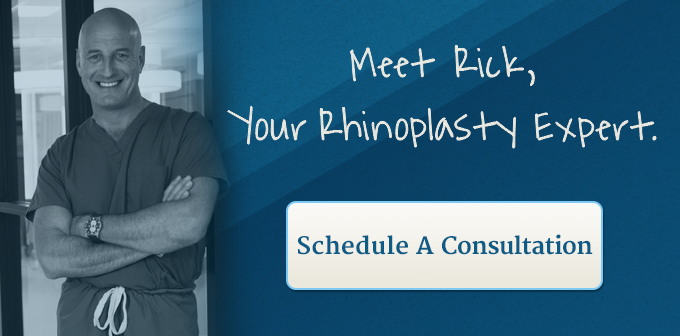Unfortunately, surgical complications are a fact of life. But that does not mean patients should be unduly worried. That’s because you and your surgeon can do a lot before and during surgery to ensure a low chance of complications. With proper patient selection on the part of your surgeon – and proper surgeon research and choice by you, rhinoplasty complications are very rare. Once the proper choices are made, most complications are avoided in the operating room. Complications do occur rarely and an expert surgeon knows just how to manage them. When you and your surgeon carefully choose each other, you can be very confident that you’re going into surgery in good hands.
Although rhinoplasty is one of the more complex plastic surgery procedures when performed by experienced rhinoplasty surgeons the incidence of complications is very low.
How Does My Surgeon Minimize the Risk of Rhinoplasty Complications?
The answer: through careful patient selection before surgery, and with meticulous technique and experience during and after your surgery. Patient selection is the process that every well-qualified rhinoplasty surgeon goes through in order to be certain each patient is properly fit for surgery.
Before conducting any type of surgery or medical procedure, a physician or surgeon has the duty to evaluate whether the patient is under an undue risk of complications. This is why your surgeon looks at your medical history, current health, age and goals for surgery. Based on this, your surgeon must decide that the benefit you will receive from surgery greatly outweighs the risk.
As a surgeon, you can be certain that after our consultation, if I agree to do surgery, it means I am confident and I expect an excellent outcome and believe that you are at low risk for complications.
Why Would I Not Be a Good Candidate for Rhinoplasty Surgery?
Making sure you’re physically and mentally healthy enough for a satisfactory surgical outcome is excellent protection for you as a patient. You don’t want a surgeon who would go forward with rhinoplasty just because you seem motivated to have the surgery. You want a surgeon who will be honest with you if you are not a good surgical candidate for your own protection.
If you’re not a good candidate for rhinoplasty, it does not necessarily mean you can never have surgery. There may be a temporary health condition that your surgeon wants you to work on before approving surgery. However, in some cases, your surgeon may feel that, in his or her professional judgment, surgery must be ruled out.
In some cases, you could even find another surgeon willing to go forward with risky surgery, but this could be gambling with your health. We would hope you would not do this unless you consider very, very carefully. If your first surgeon tells you surgery is not safe for you, be very careful about seeking a second opinion because you could put your health at risk.
Some reasons you may not be a good candidate for rhinoplasty at this time:
- Your age: Your surgeon may find that you are not emotionally ready for surgery and may suggest you wait. During adolescence, some teens may change their minds often or be influenced by peers. Some people are emotionally mature at a younger age, however, so there is no hard and fast rule, except that…in some cases, your bone structure may need to mature a bit more.
- Your health: If you have a chronic medical condition, you might not be a good candidate. Things like uncontrolled high blood pressure, diabetes, obesity and smoking do not rule you out as a rhinoplasty candidate – but they may put you at greater risk for rhinoplasty complications. If the risk is unacceptable, your surgeon will explain.
- Your goals: If you want something that is not surgically possible, your surgeon has a duty to declare that you are not a candidate. No ethical surgeon would go forward if what you want is not attainable. That would be setting you up for disappointment and surgery would be a failure, even if you had no health complications during recovery.
- Recent surgery: If you want a revision rhinoplasty, for example, to correct a prior nose job you have had elsewhere, your surgeon will require that you heal properly first. You may be judging your first surgery too soon and/or risk interfering with future healing if you undergo additional surgery in the same area too soon.
- Very recent pregnancy: There is no hard and fast rule for this situation for women. If you feel ready to have rhinoplasty fairly soon after pregnancy, you could be a good candidate. But again, if the body is still healing from one condition or procedure, performing another may not be advisable and healthy. If so, your surgeon will explain the issue.
Don’t worry, if you are not a candidate in the surgeon’s professional opinion, he or she will clearly explain why. In short, to minimize chances of rhinoplasty complications or disappointing results, an expert rhinoplasty surgeon makes sure the patient is healthy and strong enough for a good surgical outcome.
Partial List of Rhinoplasty Complications
- Anesthesia-related risks.
- Excessive bleeding (hematoma).
- Infection.
- Poor wound healing.
- Excessive scarring.
- Skin sensation changes (numbness or pain).
- Septum perforation (hole in the dividing “wall” separating the 2 nasal cavities).
- Breathing problems.
- poor nasal appearance.
- Swelling.
- Skin Discoloration.
- A possibility of revision surgery.
What Can a Patient Do to Minimize Rhinoplasty Risks?
You are already working on it. By taking the time to find an experienced rhinoplasty specialist, you are minimizing any rhinoplasty risks. That’s because an experienced and skilled plastic surgeon is also an expert in avoiding complications and handling any rare complications that should arise.
Another advantage of choosing an expert rhinoplasty specialist to perform your surgery: you will go into surgery more confident. An upbeat outlook is very important for successful surgery and quick healing. Having an expert surgeon at your side lowers your stress level – along with decreasing risk.
A checklist to reduce the risk of rhinoplasty complications:
- Research the procedure: This will include meeting with an expert rhinoplasty surgeon to get information specific to your case when you are ready. Procedure research will help you determine what questions to ask.
- Research plastic surgeons: Don’t see a surgeon who is not properly licensed and board certified in general surgery and plastic surgery. Remember that you need an expert. Proper surgical experience (and the excellent surgical technique and judgment that comes with it) matters – in minimizing rhinoplasty complications and enjoying a successful outcome from your nose job.
- Make sure the surgical facility is accredited: regular inspections are required to maintain certification, which helps to ensure your safety.
- Ask about their experience: Ask how many nasal surgeries your surgeon has done this year and how many years they have been in the field.
- Choose a surgeon with reconstructive experience, which brings with it deep knowledge of the facial and nasal structure.
- Ask about surgical privileges: your surgery will likely take place in a surgery center, but privileges are a hallmark of surgical excellence.
- Look at before and after photos and discuss with your surgeon: although all cases are different, this will give you an idea of the aesthetic judgment of your surgeon.
- Ask about the credentials of your anesthesiologist.
- Ask about your surgeon’s rate of complications. Every experienced surgeon should have dealt with complications in the past. If your surgeon denies ever having seen any complications, he or she may not be experienced or is not being honest – choose another surgeon.
- Understand all risks, including any specific to your case. Your surgeon will probably explain this without you needing to ask but ask follow-up questions until you feel that you understand.
- Ask about all the costs of the procedure.
- Take a list of these and your own additional questions to your consultation.
- Evaluate whether the surgeon answered your questions completely and understandably. Did he or she ask about your goals for the outcome and explain the strategy to achieve it?
Before and After: Evaluate, Select, Communicate and Cooperate with Your Surgeon
- Ask yourself if you trust and feel confident in this surgeon’s abilities and honesty. Don’t go forward unless you are confident.
- Be sure to follow all preparatory instructions given before surgery. Your surgeon may ask you to start or stop certain medications or supplements in the weeks or days before surgery, for example.
- Follow all instructions for healing, wound care, activity level and recovery carefully. Call your surgeon with any concerns at all, anytime. Your surgeon (or another physician they trust) should be available 24/7 during your recovery if you need assistance or information.
- Attend all follow-up appointments even after you feel you are completely healed.
Remember, rhinoplasty complications can occur, as with any surgery. Be sure to get the facts about any risks pertaining to your case. Understand the risks before undergoing surgery and choose a surgeon who knows how to handle rare complications.
Benefits of Rhinoplasty in NJ
1. Let you breathe easier, do more and enjoy better overall health
2. Promote more restful sleep
3. Make you more photogenic and/or youthful
4. Advance your career and get you more dates (if applicable)
5. Increase your self-confidence
Fun Facts About Rhinoplasty in 2018
- Just last year, there were 221,000 nose reshaping (rhinoplasty) procedures done in the United States.
- 30% of those procedures were done right here on the Northeast Coast of the country.
- Among women, rhinoplasty is the 2nd most popular cosmetic procedure, close behind breast augmentation.
- For men, rhinoplasty is the number one cosmetic procedure. These procedures are so popular partly because of their low-risk profile.
To learn more about rhinoplasty, discuss your concerns and your goals, contact Cohen/Winters Aesthetic & Reconstructive Surgery in Bergen County, NJ. Make an appointment for a no-charge consultation with a rhinoplasty specialist today.


